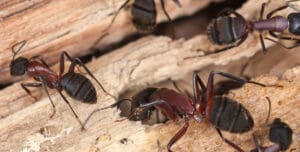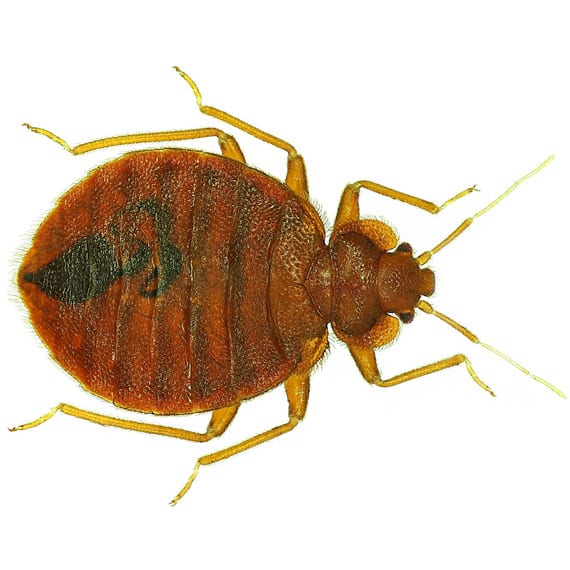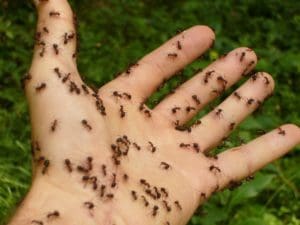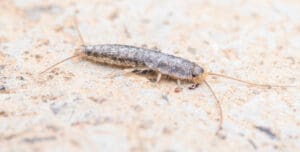

Spring Pest Prevention: How to Keep Bugs Out as the Weather Warms Up
The professionals at Twin-Boro understand the importance of keeping your home or business pest-free. As we head into spring and as temperatures rise, common household pests begin to emerge. Spring brings with it increased ant, termite, mosquito and rodent activity and with this in mind, early pest prevention is essential.
In this guide, we share tips on sealing common pest entry points, removing attractants, and tell you when you should seek professional pest control.
Why Do Pests Become More Active in Spring?
Due to a combination of environmental and biological factors, pests become increasingly active in spring time. As temperatures rise, cold-blooded pests such as insects and rodents experience a rise in metabolic activity. This is because warmer weather speeds up their bodily functions and this in turn, directs them to search for food, water, and shelter after hibernation. An increase in humidity levels during spring also creates the ideal conditions for pests like mosquitoes, ants, and termites as these pests thrive in moist environments which ultimately support their survival and reproduction.
Spring also coincides with the breeding cycles of many pest species. Longer daylight hours and warmer conditions act as natural signals, triggering mating behaviors and egg-laying.
With the above in mind, the combination of rising temperatures, increased moisture, and biological breeding cycles align in the spring which leads to a noticeable rise in pest activity.
Common Springtime Pests to Watch Out For
A variety of common household pests emerge in spring and each poses a specific problem for homes and gardens.
Ants are among the first pests to appear as spring sets in and they often invade homes in search of food. Although small, ants have the power to contaminate food supplies and, in the case of carpenter ants, can cause structural damage by building tunnels in wood. Termites also become active in spring and are notorious for destroying wooden structures which can lead to costly repairs.
Mosquitoes thrive in the warmer and wetter conditions of spring. Irritating bites aside, mosquitoes also transmit diseases like West Nile virus, Zika virus, and malaria. Wasps, including yellowjackets and hornets also begin to appear as they build their nests during this season. These buzzing creatures can be aggressive and give painful stings that pose serious risks to those allergic to their venom.
And of course, there are flies. These pests are a known nuisance in spring, notably houseflies and fruit flies.Flies breed rapidly and also spread bacteria and pathogens, contaminating food and surfaces.
Each of the above spring time pests not only disrupts outdoor enjoyment and household comfort but also poses potential health and safety risks which makes spring pest control vital.
Spring Pest Prevention Tips for Your Home
Preventing pests from making their way into your home requires a combination of proactive measures focused on eliminating entry points, food sources, and breeding grounds.
The first step is to eliminate possible entry points. Begin by sealing cracks and gaps around windows, doors, vents, and foundations. Do this by using caulk or weatherstripping areas in order to block access. Inspect screens around your home for holes and if you find any holes - repair them immediately. It is also important to eliminate standing water on your property as this will deter mosquitoes and other moisture-loving pests. With this in mind, clean your gutters and downspouts - and fix any leaks around your property.
When it comes to the interior of your property it is always important to maintain cleanliness. Make sure to regularly sweep, vacuum, and wipe down surfaces in order to remove crumbs and spills that attract pests like ants and flies.
It is vital to consider your pantry or kitchen as pests are drawn to food sources. Store your food in airtight containers and take out the trash frequently to prevent odors and waste buildup.
Routine home inspections and prompt repairs, combined with these cleanliness and maintenance practices, create an environment that is less attractive and accessible to pests, reducing the likelihood of infestations throughout the spring and beyond.
Outdoor Pest Prevention Strategies
Keeping outdoor spaces pest-free is made up of careful maintenance and strategic prevention.
- Lawn care: Regular lawn care is essential and with this in mind it is important to mow grass, trim bushes, and remove weeds. This will eliminate hiding spots for pests such as ticks, mosquitoes, and rodents.
- Remove standing water: Standing water attracts mosquitoes and other insects. Check for clogged gutters, empty birdbaths, unused planters, and any containers where rainwater collects. It is also important to refresh pet water bowls and birdbaths in order to prevent mosquito larvae from developing.
- Natural methods: Incorporating natural deterrents can also help in keeping pests away. Planting pest-repelling herbs such as basil, mint, lavender, and citronella around patios or entryways can discourage mosquitoes and flies. Another pro tip is spreading cedar mulch or diatomaceous earth in garden beds as this creates a barrier against crawling insects like ants and fleas.
- Light it up: Install outdoor lighting that doesn’t attract bugs, such as yellow-tinted bulbs. These kinds of lights can minimize flying pests around porches and patios.
- Seal trash: Ensure trash bins are sealed tightly and located away from gathering areas to avoid attracting flies, wasps, and rodents.
Through good yard hygiene, natural repellents and strategic water management, outdoor spaces can remain comfortable and largely pest-free throughout the spring and summer months.
Natural vs. Chemical Pest Control – What Works Best?
Natural pest prevention methods and chemical solutions each have distinct advantages and drawbacks.
Natural Methods
Using essential oils, planting pest-repellent plants, or applying diatomaceous earth, are generally safer for humans, pets, and beneficial insects. They pose minimal risk to the environment, as they do not introduce harmful toxins into soil or water systems.
However, natural solutions often require frequent reapplication and may take longer to show results. This makes them less immediately effective against large infestations.
Chemical Solutions
Chemical solutions like insecticides, sprays, and baits are typically more potent and provide faster, more widespread control. They are effective for severe infestations and offer longer-lasting protection with fewer applications. However, they come with safety concerns- chemical residues can be harmful to pets, children, and non-target wildlife. It is also important to note that chemical pesticides can contribute to environmental issues, including water contamination, soil degradation, and harm to pollinators like bees.
With the above in mind, many homeowners adopt an integrated approach, combining both methods to balance effectiveness, safety, and environmental responsibility.
When to Call a Professional Exterminator
While many minor pest problems can be managed with DIY methods, certain situations call for professional intervention. One clear sign is the size and persistence of the infestation.
If pests like ants, termites, or rodents continue to return despite repeated efforts to control them, it indicates a larger, possibly hidden problem that requires expert tools and knowledge.
Structural pests such as termites or carpenter ants often cause damage inside walls, floors, or foundations that may not be immediately visible. Professional inspections can detect and address these issues before they become costly.
When the infestation is severe, persistent, or poses health or structural threats, seeking professional help is the smartest option.
Enjoy a Bug-Free Spring
Whether you require residential pest control to safeguard your home or commercial pest control to protect your business, Twin-Boro’s expert intervention ensures long-lasting, effective results. We have the tools, knowledge, and safe treatments necessary to handle persistent or large-scale infestations.
Don’t wait until pests take over your space- prevention is always easier and more cost-effective than dealing with a full-blown problem. For comprehensive pest solutions tailored to your needs, contact us today. Let us help you enjoy a pest-free spring and peace of mind year-round.






